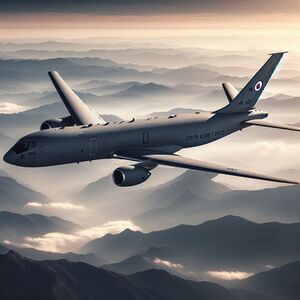KR-95 STARS: Difference between revisions
(→Design) |
(→Design) |
||
| Line 27: | Line 27: | ||
==Design== | ==Design== | ||
KR-95 can monitor up to 2,000 targets using a X-Band synthetic aperture radar(SAR) attached to the underside of the fuselage. With a 360-degree range, the radar can monitor areas up to a 440 | KR-95 can monitor up to 2,000 targets using a X-Band synthetic aperture radar(SAR) attached to the underside of the fuselage. With a 360-degree range, the radar can monitor areas up to a 440 km radius in real-time, and can detect targets ranging from 0.3m in size to larger ones. Using this superior detection capability, the radar can identify detailed information about targets such as enemy tanks, trucks, and SAM batteries and transmit information to command and ground units. The radar can also identify enemy low-speed aircraft or helicopters flying at an altitude lower than KR-95. | ||
The KR-95 can be linked with [[Joseon]]'s Battle Management System, [[Gongmyeong-2E]], to share real-time information with other units and vehicles, aircraft, ships, and command units. Interworking information with each unit, the KR-95 acts as a kind of air command post, and can deliver real-time battlefield information to over thousands of friendly units and command each unit. | The KR-95 can be linked with [[Joseon]]'s Battle Management System, [[Gongmyeong-2E]], to share real-time information with other units and vehicles, aircraft, ships, and command units. Interworking information with each unit, the KR-95 acts as a kind of air command post, and can deliver real-time battlefield information to over thousands of friendly units and command each unit. | ||
Revision as of 06:29, 2 October 2024
| KR-95 STARS | |
|---|---|

| |
| A KR-95 STARS aircraft is passing over the Taebaek Mountains. | |
| Role | Airborne Battle Management and ISTAR |
| National origin | |
| Manufacturer | Daesung Aerospace,. Inc. |
| First flight | 7 October 2015 |
| Introduction | 12 August 2018 |
| Status | In service |
| Primary user | Royal Joseon Air Force |
| Produced | 2015-2022 |
| Number built | 12 |
The KR-95 STARS(Surveillance Target Attack Radar System) is an aircraft designed and produced for real-time ground surveillance, battlefield management, and command & control. It uses various sensors to monitor parts of the ground or air and to control ground forces.
The KR-95 was the first ground command and control aircraft of the Royal Joseon Armed Forces, bringing a major change to the strategy and tactics of the Royal Joseon Armed Forces.
Development
Design
KR-95 can monitor up to 2,000 targets using a X-Band synthetic aperture radar(SAR) attached to the underside of the fuselage. With a 360-degree range, the radar can monitor areas up to a 440 km radius in real-time, and can detect targets ranging from 0.3m in size to larger ones. Using this superior detection capability, the radar can identify detailed information about targets such as enemy tanks, trucks, and SAM batteries and transmit information to command and ground units. The radar can also identify enemy low-speed aircraft or helicopters flying at an altitude lower than KR-95.
The KR-95 can be linked with Joseon's Battle Management System, Gongmyeong-2E, to share real-time information with other units and vehicles, aircraft, ships, and command units. Interworking information with each unit, the KR-95 acts as a kind of air command post, and can deliver real-time battlefield information to over thousands of friendly units and command each unit.
KR-95 reduces the RCS of aircraft by applying Radar Absorbent Material throughout the fuselage. The RCS of KR-95 is not known in detail, but according to disclosed during the National Assembly's interpellation session, the RCS of KR-95 is comparable to that of a typical business jet.
Block II
In 2031, KR-95 was upgraded to Block II and equipped with battlefield analysis and command-assisted artificial intelligence(AI). With this, KR-95 is able to provide faster and more accurate battlefield and information analysis using AI. Using its own algorithm, the AI analyzes real-time information of thousands of enemy units and friendly units and provides the human crew with the optimal calculations derived from them. This allows the human crew to perform faster and more efficient battlefield analysis.
Protection
The KR-95 is equipped with many consumable decoys, such as chaff, and flares, to neutralize the enemy's missile threat, and is also equipped with an ECM system.
Also, KMAQ-2 has military-grade protection against non-nuclear and nuclear shock wave EMPs.